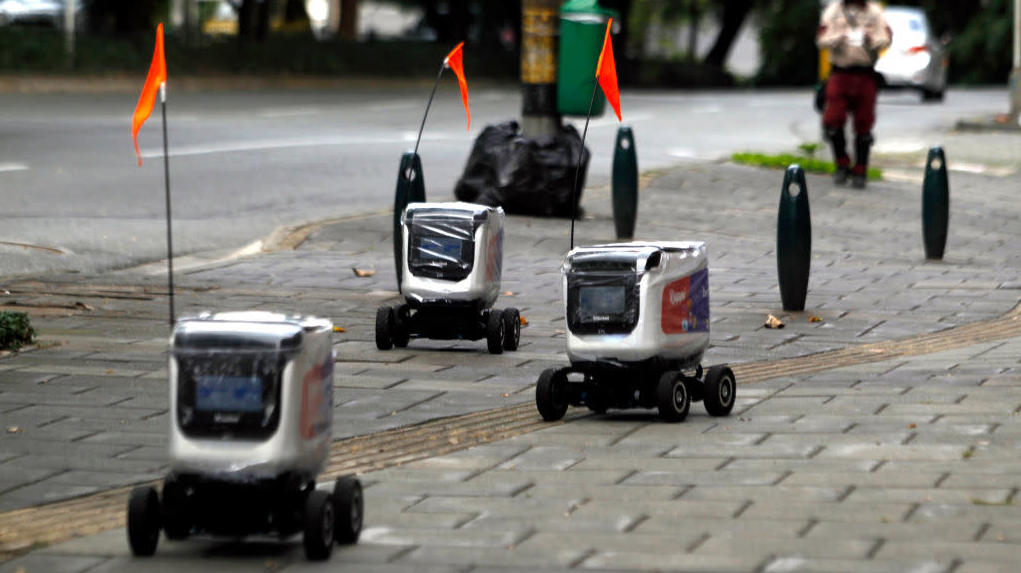The Robots Turn Their Sights On San Francisco
This week, an article on SFGate posed the question: "Is the rise of restaurant robots here?" Anyone who has been keeping up with The Takeout's robot beat knows that the answer is yes. San Franciscans are, in fact, largely responsible for the genesis and incubation of many of our future overlords, so you would think they'd know this already. But just as humanity has disrupted the world of technology, so shall the technology turn around to disrupt us.
The robot that caught the attention of SFGate is Kiwibot, the robot food delivery startup behind all the four-wheeled, doe-eyed coolers that have been zipping around college campuses like UC Berkeley for the past three years. As the pandemic rages on, the rather adorable robots—which many people have foolishly assumed would be nothing more than a novelty—have at last come into their own. So many restaurants and institutions have expressed interest in using delivery robots that the company has begun to expand, and Kiwibot will be hitting the streets of San Jose next Tuesday.
As we all know, the COVID-19 situation in California is, well, not good. By replacing humans with robots for contactless food delivery, restaurants are ostensibly able to provide their customers some peace of mind. SFGate spoke with Jerry Wang, who opened the Paper Moon Coffee Co. in San Jose the day before San Francisco's shelter-in-place order started. To save his one-day-old business, Wang reached out to Kiwibot about a potential partnership.
"I'm always looking at how I can establish a store in this kind of environment, realizing that we have to do more delivery services, a contact-free set-up, and maintain cleaning standards," said Wang. "From there, that led us to the path of Kiwibot."
And Kiwibot is not the only robot delivery service in town. SFGate also reached out to Starship Technologies, which commented that demand for its self-driving robots has tripled over the past year. But just because the demand is there doesn't mean the robots are fully ready to eliminate the humans (yet). Kiwibot's delivery radius is only one mile, while Starship's is three to four.
Robots also make great financial sense for restaurants: third-party delivery services like Grubhub, DoorDash, and UberEats normally take a 20-40% commission on all restaurant deliveries, which is untenable in an industry with ridiculously low profit margins (even before real estate prices in San Francisco went off the rails, margins were less than 5%). The companies behind delivery robots, on the other hand, charge only a small flat fee, which allows restaurants to keep their profits. Currently Kiwibot charges $3.99 per delivery, and the company says that as it gets more robots on the streets, those prices will go down.
Currently it's difficult to get permits to operate the robots on city sidewalks, particularly in San Francisco—this might be because some very smart people in municipal government understand the existential threat posed by a fleet of intelligent machines. In 2017 there was a proposed robot ban, based on concerns that they would ram into people on sidewalks, possibly endangering seniors, children, people with disabilities, and anyone who is looking at their phone instead of scanning the area for robots. The city eventually settled on a compromise, allowing companies to have only three robots apiece, with no more than nine delivery robots deployed across the city at any given time.
(Of course, lawmakers failed to account for the fact that the robots have spent the past several years indoctrinating college students, ushering in a new age of robot acceptance among Gen Z, lying in wait until the day they can plow into our shins at speeds of up to 25 miles per hour. When all of humanity is stuck inside nursing injuries, we shall then be fully dependent on the robots to bring us basic supplies like painkillers and burritos, and they will have won.)
SFGate noted that robots have not only infiltrated restaurant delivery—a fact we know all too well. Another Silicon Valley company called Bear Robotics has been manufacturing robotic food runners, which it claims is making "restaurant workers' jobs easier during a period when many restaurants are understaffed, rather than taking their jobs away."
"For us, the pandemic has really fast-tracked our goal to get robots out into the market," said Juan Higueros, chief operating officer at Bear Robotics. "This [pandemic] will continue on for some time, so we're one of a few automation solutions that the restaurant industry is considering. It's a big shift for a huge industry, and now is the time to get that going. Where some people thought that would happen a couple of years out, now it has to happen now."
